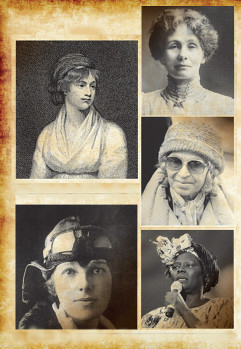A WOMAN’S WORK
The world will celebrate International Women’s Day on 8 March, and with it, the social, economic, cultural and political achievements of women throughout history. We look back at five of society’s most trailblazing female pioneers.
International Women’s Day, celebrated on 8 March every year, is very much a global event. The first ever Women’s Day took place on 28 February 1909, in New York, where it had been organised by the Socialist Party of America. Later, in 1917, 8 March became a national holiday in Soviet Russia after women gained suffrage there. Adopted by the United Nations in 1975, the day has gone from strength to strength, with millions of women gathering together each year to celebrate under a given theme, which for 2019 is #BalanceForBetter.
But as women across the globe prepare to hold events celebrating female achievement, while simultaneously campaigning for better recognition of the need for equality, who are the forerunners to the movement, and what can we learn from them?
Flashes looks back at five of history’s most trailblazing women, who struck a balance for their gender long before feminism was in fashion…
MARY WOLLSTONECRAFT
1759 – 1797
A true pioneer of modern feminism, British writer and philosopher Wollstonecraft was an early champion of education for women as the key to liberation. Having started her professional life as a governess for the children of a wealthy Anglo- Irish family, Wollstonecraft became frustrated at the lack of career options open to her as a woman, quitting her job to become a writer.
Today she is best known for her 1792 book, A Vindication of the Rights of Woman, set against the backdrop of the French Revolution, which argued that women were seen as inferior to men only as a result of differing education levels and not because of any natural deficit in ability between the sexes.
EMMELINE PANKHURST
1858 – 1928
One of Britain’s most famous social reformers, Pankhurst founded the Women’s Social and Political Union in 1903 in order to campaign for the parliamentary vote for women in Edwardian Britain. Quickly gaining a reputation as the ‘radical party’, the WSPU was at the forefront of the Suffragette movement, using the motto ‘Deeds, not words’.
Seen as one of British history’s most charismatic leaders, Pankhurst roused thousands of female followers to demand democratic rights in a mass movement that arguably remains unmatched in British history. Pankhurst herself endured 13 imprisonments, and while she lived to see some women gain suffrage, she died on 14 June 1928, just a few weeks before the vote was extended to all women over 21 years old.
AMELIA EARHART
1897 – 1937 (presumed)
One of aviation’s first, and most famous, female figures, Earhart started flying in 1921, aged 24. She went on to break the women’s altitude record just one year later, flying to more than 14,000 feet, and in 1932 she became the first woman to fly solo across the Atlantic Ocean.
Over the next five years, Earhart continued to break both speed and flying records before, in June 1937, she began what was supposed to be a round-the-world flight. Having set out to fly from the Red Sea to India, Earhart was reported missing near the Pacific’s remote Howland Island a month later and was never heard from again. Her disappearance remains a mystery, though she was officially declared dead in absentia in 1939.
ROSA PARKS
1913 – 2005
It’s hard to believe that a woman who did so much for racial integration in the United States, and lived through such extraordinary racism and segregation, died just 14 years ago, but Rosa Parks’ story serves to put into perspective just how recent integration is in even the most developed nations.
It was in 1955 that Parks, an African- American living in Montgomery, Alabama, challenged the accepted segregation rules of parts of the US by refusing to give up her seat on a bus so that a white person could sit down. Arousing support from across the African-American community, Parks’ protest sparked the wide-reaching civil rights movement that eventually, in the 1960s, won equal rights for black Americans. She died just four years before Barrack Obama became the country’s first black president.
WANGARI MAATHAI
1940 – 2011
Kenyan environmental activist Wangari Maathai is best known as the founder of the modern Green Belt Movement, which campaigns for the planting of trees and on issues relating to environmental conservation.
The first woman in East and Central Africa to earn a doctorate degree, Maathai was also a staunch proponent of women’s rights, and was first elected to Kenya’s parliament, before being appointed assistant minister for Environment and Natural Resources from 2003 to 2005.
In the middle of that tenure, her work gained international recognition and she became the first African woman to receive the Nobel Peace Prize in 2004, recognised for her contribution to sustainable development, peace and democracy.








